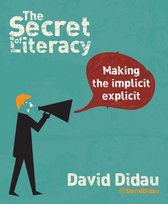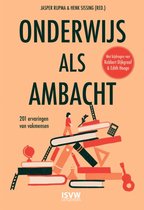What if everything you knew about education was wrong? Ebook Tooltip Ebooks kunnen worden gelezen op uw computer en op daarvoor geschikte e-readers.
Afbeeldingen
Artikel vergelijken
Samenvatting
If you feel a bit cross at the presumption of some oik daring to suggest everything you know about education might be wrong, please take it with a pinch of salt. What if everything you knew about education was wrong? is just a title. Of course, you probably think a great many things that aren't wrong. The aim of the book is to help you 'murder your darlings'. David Didau will question your most deeply held assumptions about teaching and learning, expose them to the fiery eye of reason and see if they can still walk in a straight line after the experience. It seems reasonable to suggest that only if a theory or approach can withstand the fiercest scrutiny should it be encouraged in classrooms. David makes no apologies for this; why wouldn't you be sceptical of what you're told and what you think you know? As educated professionals, we ought to strive to assemble a more accurate, informed or at least considered understanding of the world around us. Here, David shares with you some tools to help you question your assumptions and assist you in picking through what you believe. He will stew findings from the shiny white laboratories of cognitive psychology, stir in a generous dash of classroom research and serve up a side order of experience and observation. Whether you spit it out or lap it up matters not. If you come out the other end having vigorously and violently disagreed with him, you'll at least have had to think hard about what you believe. The book draws on research from the field of cognitive science to expertly analyse some of the unexamined meta-beliefs in education. In Part 1; 'Why we're wrong', David dismantles what we think we know; examining cognitive traps and biases, assumptions, gut feelings and the problem of evidence. Part 2 delves deeper - 'Through the threshold' - looking at progress, liminality and threshold concepts, the science of learning, and the difference between novices and experts. In Part 3, David asks us the question 'What could we do differently?' and offers some considered insights into spacing and interleaving, the testing effect, the generation effect, reducing feedback and why difficult is desirable. While Part 4 challenges us to consider 'What else might we be getting wrong?'; cogitating formative assessment, lesson observation, grit and growth, differentiation, praise, motivation and creativity.
Productspecificaties
Inhoud
- Taal
- en
- Bindwijze
- E-book
- Oorspronkelijke releasedatum
- 10 juni 2015
- Ebook Formaat
- Adobe ePub
- Illustraties
- Nee
Betrokkenen
- Hoofdauteur
- David Didau
- Hoofduitgeverij
- Crown House Publishing
Lees mogelijkheden
- Lees dit ebook op
- Android (smartphone en tablet) | Kobo e-reader | Desktop (Mac en Windows) | iOS (smartphone en tablet) | Windows (smartphone en tablet)
Overige kenmerken
- Product breedte
- 15.60 cm
- Product hoogte
- 2.60 cm
- Product lengte
- 23.40 cm
- Studieboek
- Ja
- Verpakking hoogte
- 36 mm
- Verpakkingsgewicht
- 0.38 kg
EAN
- EAN
- 9781845909802
Je vindt dit artikel in
- Boek, ebook of luisterboek?
- Ebook
- Studieboek of algemeen
- Studieboeken
- Taal
- Engels
- Beschikbaarheid
- Leverbaar
Kies gewenste uitvoering
Prijsinformatie en bestellen
De prijs van dit product is 18 euro en 99 cent.- E-book is direct beschikbaar na aankoop
- E-books lezen is voordelig
- Dag en nacht klantenservice
- Veilig betalen
Rapporteer dit artikel
Je wilt melding doen van illegale inhoud over dit artikel:
- Ik wil melding doen als klant
- Ik wil melding doen als autoriteit of trusted flagger
- Ik wil melding doen als partner
- Ik wil melding doen als merkhouder
Geen klant, autoriteit, trusted flagger, merkhouder of partner? Gebruik dan onderstaande link om melding te doen.








